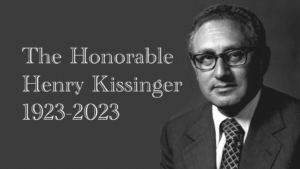The labels “genius” and “visionary” are too often bestowed on people who are not worthy of those titles. That was not the case with my good friend and mentor Douglas Bruce Lenat — he was both a genius and a visionary. I am deeply saddened by the loss of Doug and what he means both to the AI community and to me and my colleagues at Enterra®. He was truly a seminal thinker in semantic reasoning and symbolic artificial intelligence (AI). He was a warm, happy, and intellectually-generous colleague who loved his family, his work, and his company Cycorp. I was fortunate to have collaborated with him for nearly 20 years. He was a colleague, a mentor, a tutor, and someone who I am proud to call my Friend.
Doug had a great academic and professional career. While still in college, Doug supported himself by programming for the United States Navy. He worked on a natural language interface database that served as a seminal, online, shipboard operations manual for use on U.S. aircraft carriers. In 1972, he simultaneously received his bachelor’s degree in Mathematics and Physics, and his master’s degree in Applied Mathematics from the University of Pennsylvania. Before entering the business world, he was a Ph.D. student in Computer Science at Stanford University. He was also the only individual ever to serve on the Scientific Advisory Boards of both Microsoft and Apple.
He was a pioneer in the field of machine learning and artificial intelligence (AI). In 1976, four years after graduating from the University of Pennsylvania, Doug was awarded the biannual IJCAI Computers and Thought Award for creating the machine-learning program AM. His AM and Eurisko programs focused on symbolic (rather than statistical) machine learning for knowledge representation. He continued his work on “ontological engineering” with his Cyc program at MCC for ten years until he founded Cycorp in 1994. As journalist Cade Metz reported, “[His vision was] creating a ‘knowledge base’ called Cyc that can endow computers with something approaching common sense.”[1] Computer scientists Ernest Davis and Gary Marcus explain, “The CYC program … was initiated in 1984 by Doug Lenat, who has led the project throughout its existence. Its initial proposed methodology was to encode the knowledge in 400 sample articles in a one-volume desk encyclopedia together with all the implicit background knowledge that a reader would need to understand the articles (hence the name). It was initially planned as a ten-year project, but continues to this day … with no end in sight.”[2]
In his tribute to Doug, Marcus wrote, “Doug Lenat was one of the most brilliant, acerbically funny people I have ever met. If people like Marvin Minsky, John McCarthy, and Allen Newell were among the first to think deeply about how symbolic AI, in which machines manipulate explicit verbal-like representations, might work, Doug was the first to try really hard to make it actually work. … Metaphorically, Lenat tried to find a path across the mountain of common sense, the millions of things we know about the world but rarely articulate.”[3] When I learned of Doug’s passing, I was heartbroken. I immediately thought of the wonderful poem by the late Maya Angelou entitled “When Great Trees Fall.” In part the poem reads:
When great souls die,
the air around us becomes
light, rare, sterile.
We breathe, briefly.
Our eyes, briefly,
see with
a hurtful clarity.
Our memory, suddenly sharpened,
examines,
gnaws on kind words
unsaid,
promised walks
never taken.
News of Doug’s passing brought back memories of our many meetings as well as hundreds of conversations about AI and our current and future collaborations. I recalled dinners with Doug and his wife Mary at Eddie V’s and other Mexican, Southwestern cuisine, and barbeque restaurants in Austin, Texas. Doug introduced me to TTI Vanguard (a future scanning conference that he helped found) that I am a member of today. He loved going to the TTI Vanguard conferences and having spirited intellectual banter with his scientific colleagues. TTI Vanguard has always included a Who’s Who of technology industry titans and Doug loved his interactions with them. Since Doug’s passing, I have been calling TTI Vanguard colleagues to inform them of Doug’s passing. All of them has shared with me a sense of loss and sadness.
Over a nearly 20-year period, I enjoyed ongoing private tutorials with Doug. He taught me about semantic reasoning and symbolic AI from the ground up. He gave me a syllabus of books and papers to read. He explained the sections I struggled to understand with the patience of a professor. He was incredibly generous with his time, walking me through the theoretical constructs of the science of artificial intelligence; as well as how AI technologically manifests itself practically in software. We discussed AI’s capabilities, its deficiencies, and how to build upon work that Cyc is doing with work that Enterra and my sister company Massive Dynamics™ are doing in applied high dimensional mathematics and non-linear optimization. At about the same time, I was having similar informal private tutorials with Princeton Professor Herschel Rabitz and mathematician Dr. Caleb Bastian at Massive Dynamics™. Those conversations focused on high dimensional mathematics and functional analysis. These interactions lead to one of my more memorable collaborations with Doug.
When I was a Visiting Professional Executive in Cognitive Reasoning Platforms at the Department of Chemistry at Princeton, I invited Doug to come to the Frick Laboratory and give a talk to Professor Rabitz’ group of PhD and post-doctoral students on the topic of semantic reasoning and symbolic AI. It was a wonderful talk during which Doug explained the concepts and structures of ontologies, inference reasoners, and the journey towards artificial general intelligence. The audience’s eyes visibly widened when Doug explained how these technologies worked and pointed out their potential. I remember Professor Rabitz challenging Doug to see if his Cyc technology could ingest the content of chemistry textbooks and build a reasoning agent capable of teaching chemistry to incoming freshman. In true Doug form, and with the enthusiasm of a young scientist, he explained in detail exactly how that could be possible. It was amazing watching these men, who are incredibly esteemed in their respective scientific fields, mentally cross the lines separating their scientific fields to align in new and exciting ways. In that moment, watching and listening to my mentors/tutors and colleagues, I metaphorically saw two giant intellectual trees standing next to each other. As they chatted, I realized that each of them represented a component part of the ensemble of technologies used by my companies to create the Enterra Autonomous Decision Science™ platform. It was very satisfying for me. I will greatly miss my interactions with my friend Doug.
The famous English scientist Sir Isaac Newton once said, “If I have seen further, it is by standing on the shoulders of giants.” Doug is one of the giants upon whose shoulders future computer scientists will stand. The closing stanza of Maya Angelou’s poem reads:
And when great souls die,
after a period peace blooms,
slowly and always
irregularly. Spaces fill
with a kind of
soothing electric vibration.
Our senses, restored, never
to be the same, whisper to us.
They existed. They existed.
We can be. Be and be
better. For they existed.
Few people go to their rest knowing that their work will continue and that their efforts will continue to have an important impact on history. Doug’s work will. He existed and we are better because he existed.
Farewell my friend, I hope to see you once again in the next life.
Footnotes
[1] Cade Metz, “Paul Allen Wants to Teach Machines Common Sense,” The New York Times, 28 February 2018.
[2] Ernest Davis and Gary Marcus, “Commonsense Reasoning and Commonsense Knowledge in Artificial Intelligence,” Communications of the ACM, September 2015.
[3] Gary Marcus, “Doug Lenat, 1950-2023: AI has lost a giant,” Substack, 1 September 2023.





